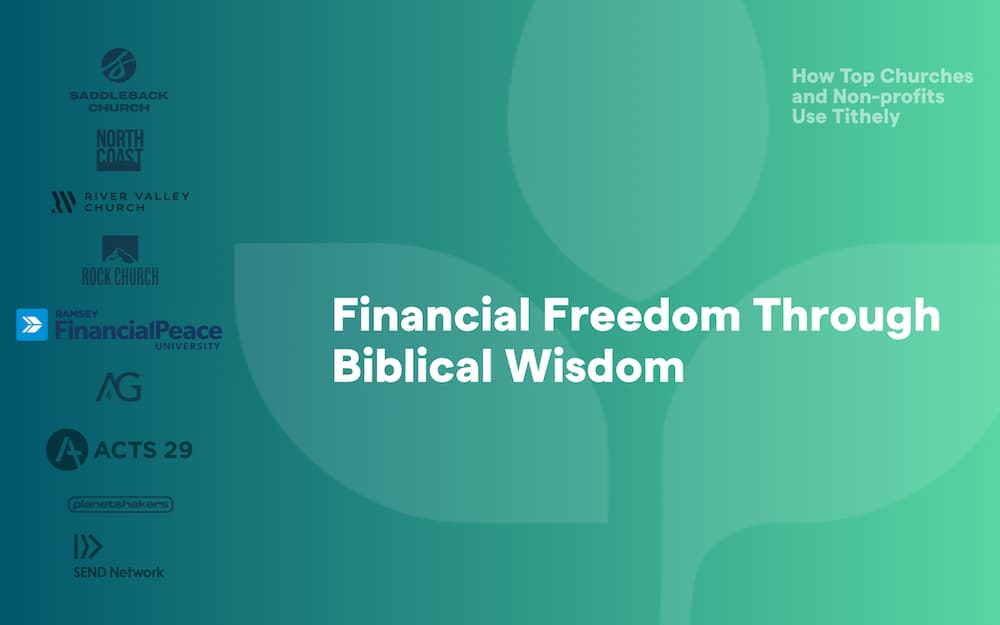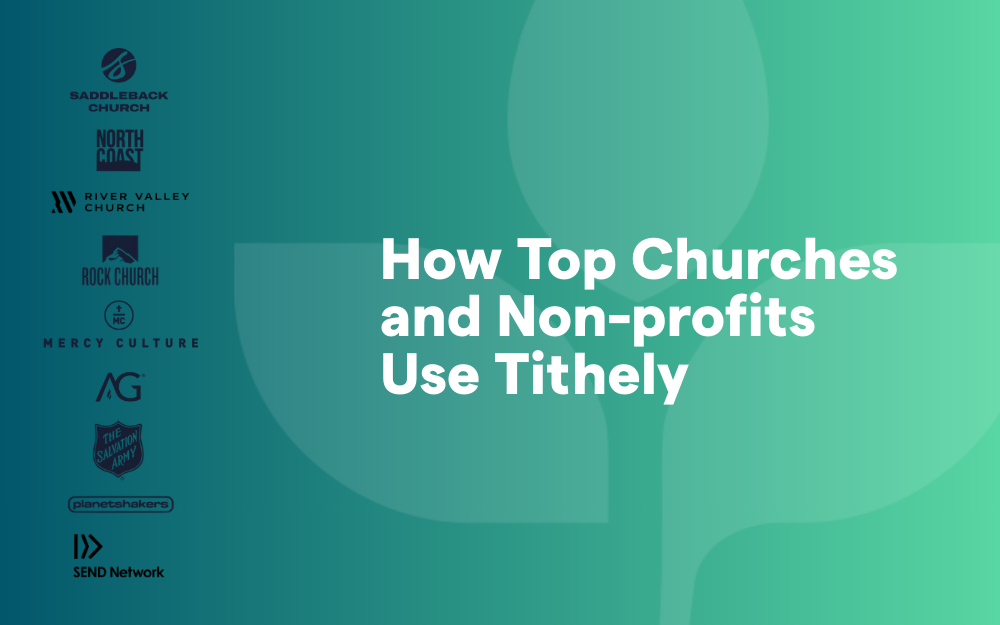Stewardship Defined: Why It's About Far More Than Money
Biblical stewardship is about wisely managing everything that God has given us–our time, opportunities, energy, talents, thoughts, belongings, and finances.

When most people hear the word stewardship, their minds immediately jump to their finances. They imagine tithing, giving to special offerings, and spending their money wisely outside of monthly giving. And yes–that is a big part of what it means to be a good steward. However, it is about so much more than just money.
RC Sproul famously wrote, "Stewardship is about exercising our God-given dominion over His creation, reflecting the image of our creator God in our care, responsibility, maintenance, protection, and beautification of His creation."
Biblical stewardship is about wisely managing everything that God has given us–our time, opportunities, energy, talents, thoughts, belongings, and finances. It's about utilizing what we have for the glory of God and to grow and expand His kingdom rather than our own. When we define stewardship as Christians, we encompass everything in our possession–concrete and abstract things–to advance God's good news.
When we look at how we define stewardship in the Bible, we see many examples of good stewards, such as Adam, Moses, Noah, and Joseph. But there is no better example of stewardship than Jesus himself. When we allow Jesus to define stewardship, we see that it encompasses every bit of our existence being used for the glory of God. Jesus never hesitated to give all of himself to furthering God's kingdom, and he walked in wisdom and sacrificial love at all times.
Christian theologians, pastors, and church leaders accept four universal principles of stewardship based on God's word: ownership, responsibility, accountability, and reward. Let's take a look at each and how they apply to every aspect of stewardship rather than just our finances.
Ownership
Everything we have was given to us and ultimately belongs to God. Paul said it best in 1 Corinthians 4:7. He said, "What do you have that you did not receive? And if you did receive it, why do you boast as though you did not?" We are so protective over our things and our belongings, including abstract things like our time and our abilities, but it was all given to us by the Lord.
When we feign ownership or unrightfully claim things as solely ours, we withhold good from those around us and rob ourselves of blessings. When we can hold everything we have with an open hand, we see our place in the world more accurately–that is, as stewards and managers of what we have been lovingly given rather than as power-hungry, white-knuckled owners.
One of the biggest keys to being a good steward is acknowledging that ownership of everything–our time, talents, finances, the earth, our loved ones, our belongings–belongs to God. When we can live and act with this mindset that nothing truly belongs to us, it is far easier to be generous with what has been entrusted to us.
"Stewardship is about exercising our God-given dominion over His creation, reflecting the image of our creator God in our care, responsibility, maintenance, protection, and beautification of His creation." - RC Sproul
Responsibility
Because we have, we are responsible. It truly is that simple.
Think about a child who has been given a new toy for his birthday. He did nothing to earn or even deserve the toy, but it was gifted to him in love. Does that mean it is not his responsibility to take care of it? Not at all. He is still held responsible for ensuring the toy is cared for, put away, and played with appropriately. The same applies to everything we have in life.
Our talents, skills, and abilities are gifts from God, but that doesn't mean we can keep them to ourselves or use them irresponsibly. We have a responsibility to our Heavenly Father and to those around us in the world to use our talents for the good of our world.
The same rings true when it comes to our time. If we spend all of our time doing only things we enjoy but never give our time to those in need or those we care for, we are not using our time responsibly.
Stewardship, defined by our Christian beliefs, leads us toward wisely and responsibly managing every single thing we have access to. This not only applies to our time, talents, and physical belongings, but it also applies to people and things around us. It involves caring for those in need, taking care of the land, caring for animals, and more.
Accountability
The Bible assures us that we will be held accountable for how we use what is entrusted to us during our lifetimes. The Parable of the Talents is a great example. The servant who was the most responsible with his talents was then given more, whereas the one who was irresponsible had his talent taken away from him, displaying the principle of accountability.
While the most widely accepted definition of a talent in the Bible is a coin, it can also be an actual talent–a God-given gift or skill. Whether actual money or a skill, God expects us to use these things wisely and responsibly, and He will hold us accountable if we do not.
In the Parable of the Shrewd Manager, we see another example of accountability. At the end of the story, after the shrewd manager has redeemed himself and set right the things that were wrong, we hear Jesus say, "Whoever can be trusted with very little can also be trusted with much, and whoever is dishonest with very little will also be dishonest with much" (Luke 16:10).
The Lord holds all of us accountable and rewards those who show responsibility and good stewardship with the things He has given us. Luke 12:48 further emphasizes this concept: "From everyone who has been given much, much will be demanded; and from the one who has been entrusted with much, much more will be asked."
Accountability is a normal part of life and being an adult, but it has Biblical principles that should impact our daily decisions, particularly when it comes to how we steward what has been given to us.
Reward
As Christians, we know that our reward is in heaven and that it doesn't come from our works. When we have Christ living in us, we have right standing with the Lord simply by existing. But that doesn't mean that we shouldn't aim for obedience and faithfulness in all we do.
When we are good stewards of what God has given us, we show Him that we are faithful members of His family and that we can be trusted. When we show obedience and faith in small matters, we show Him that we are responsible enough to be given larger responsibilities, often resulting in larger blessings.
While earthly and heavenly rewards from God are great, they are not the only thing inspiring us to be good stewards. Our relationship with God and our desire to make Him happy are other driving factors behind our decision-making, and feeling like we're contributing to the world in a positive way can spur us on toward better stewardship as well.
Yes, our reward is in heaven, and yes, good choices on earth don't always result in immediate blessings. However, when we choose to steward our things wisely, we often see rewards on this earth that can continue encouraging us to live for the Lord and be good stewards of what He's blessed us with.
Stewardship and Your Church
When we define stewardship and choose to recognize its importance, we can all make great strides toward Christlikeness. Here at Tithely, we aim to simplify giving in your church, among other things, but we know that stewardship is defined by far more than just giving financially. We love to hear your stories of faithful stewardship in your church families, many of which go far beyond tithing. Connect with us today to share your story and see how Tithely can help you define stewardship more comprehensively for your church.
Sign Up for Product Updates
When most people hear the word stewardship, their minds immediately jump to their finances. They imagine tithing, giving to special offerings, and spending their money wisely outside of monthly giving. And yes–that is a big part of what it means to be a good steward. However, it is about so much more than just money.
RC Sproul famously wrote, "Stewardship is about exercising our God-given dominion over His creation, reflecting the image of our creator God in our care, responsibility, maintenance, protection, and beautification of His creation."
Biblical stewardship is about wisely managing everything that God has given us–our time, opportunities, energy, talents, thoughts, belongings, and finances. It's about utilizing what we have for the glory of God and to grow and expand His kingdom rather than our own. When we define stewardship as Christians, we encompass everything in our possession–concrete and abstract things–to advance God's good news.
When we look at how we define stewardship in the Bible, we see many examples of good stewards, such as Adam, Moses, Noah, and Joseph. But there is no better example of stewardship than Jesus himself. When we allow Jesus to define stewardship, we see that it encompasses every bit of our existence being used for the glory of God. Jesus never hesitated to give all of himself to furthering God's kingdom, and he walked in wisdom and sacrificial love at all times.
Christian theologians, pastors, and church leaders accept four universal principles of stewardship based on God's word: ownership, responsibility, accountability, and reward. Let's take a look at each and how they apply to every aspect of stewardship rather than just our finances.
Ownership
Everything we have was given to us and ultimately belongs to God. Paul said it best in 1 Corinthians 4:7. He said, "What do you have that you did not receive? And if you did receive it, why do you boast as though you did not?" We are so protective over our things and our belongings, including abstract things like our time and our abilities, but it was all given to us by the Lord.
When we feign ownership or unrightfully claim things as solely ours, we withhold good from those around us and rob ourselves of blessings. When we can hold everything we have with an open hand, we see our place in the world more accurately–that is, as stewards and managers of what we have been lovingly given rather than as power-hungry, white-knuckled owners.
One of the biggest keys to being a good steward is acknowledging that ownership of everything–our time, talents, finances, the earth, our loved ones, our belongings–belongs to God. When we can live and act with this mindset that nothing truly belongs to us, it is far easier to be generous with what has been entrusted to us.
"Stewardship is about exercising our God-given dominion over His creation, reflecting the image of our creator God in our care, responsibility, maintenance, protection, and beautification of His creation." - RC Sproul
Responsibility
Because we have, we are responsible. It truly is that simple.
Think about a child who has been given a new toy for his birthday. He did nothing to earn or even deserve the toy, but it was gifted to him in love. Does that mean it is not his responsibility to take care of it? Not at all. He is still held responsible for ensuring the toy is cared for, put away, and played with appropriately. The same applies to everything we have in life.
Our talents, skills, and abilities are gifts from God, but that doesn't mean we can keep them to ourselves or use them irresponsibly. We have a responsibility to our Heavenly Father and to those around us in the world to use our talents for the good of our world.
The same rings true when it comes to our time. If we spend all of our time doing only things we enjoy but never give our time to those in need or those we care for, we are not using our time responsibly.
Stewardship, defined by our Christian beliefs, leads us toward wisely and responsibly managing every single thing we have access to. This not only applies to our time, talents, and physical belongings, but it also applies to people and things around us. It involves caring for those in need, taking care of the land, caring for animals, and more.
Accountability
The Bible assures us that we will be held accountable for how we use what is entrusted to us during our lifetimes. The Parable of the Talents is a great example. The servant who was the most responsible with his talents was then given more, whereas the one who was irresponsible had his talent taken away from him, displaying the principle of accountability.
While the most widely accepted definition of a talent in the Bible is a coin, it can also be an actual talent–a God-given gift or skill. Whether actual money or a skill, God expects us to use these things wisely and responsibly, and He will hold us accountable if we do not.
In the Parable of the Shrewd Manager, we see another example of accountability. At the end of the story, after the shrewd manager has redeemed himself and set right the things that were wrong, we hear Jesus say, "Whoever can be trusted with very little can also be trusted with much, and whoever is dishonest with very little will also be dishonest with much" (Luke 16:10).
The Lord holds all of us accountable and rewards those who show responsibility and good stewardship with the things He has given us. Luke 12:48 further emphasizes this concept: "From everyone who has been given much, much will be demanded; and from the one who has been entrusted with much, much more will be asked."
Accountability is a normal part of life and being an adult, but it has Biblical principles that should impact our daily decisions, particularly when it comes to how we steward what has been given to us.
Reward
As Christians, we know that our reward is in heaven and that it doesn't come from our works. When we have Christ living in us, we have right standing with the Lord simply by existing. But that doesn't mean that we shouldn't aim for obedience and faithfulness in all we do.
When we are good stewards of what God has given us, we show Him that we are faithful members of His family and that we can be trusted. When we show obedience and faith in small matters, we show Him that we are responsible enough to be given larger responsibilities, often resulting in larger blessings.
While earthly and heavenly rewards from God are great, they are not the only thing inspiring us to be good stewards. Our relationship with God and our desire to make Him happy are other driving factors behind our decision-making, and feeling like we're contributing to the world in a positive way can spur us on toward better stewardship as well.
Yes, our reward is in heaven, and yes, good choices on earth don't always result in immediate blessings. However, when we choose to steward our things wisely, we often see rewards on this earth that can continue encouraging us to live for the Lord and be good stewards of what He's blessed us with.
Stewardship and Your Church
When we define stewardship and choose to recognize its importance, we can all make great strides toward Christlikeness. Here at Tithely, we aim to simplify giving in your church, among other things, but we know that stewardship is defined by far more than just giving financially. We love to hear your stories of faithful stewardship in your church families, many of which go far beyond tithing. Connect with us today to share your story and see how Tithely can help you define stewardship more comprehensively for your church.
podcast transcript
When most people hear the word stewardship, their minds immediately jump to their finances. They imagine tithing, giving to special offerings, and spending their money wisely outside of monthly giving. And yes–that is a big part of what it means to be a good steward. However, it is about so much more than just money.
RC Sproul famously wrote, "Stewardship is about exercising our God-given dominion over His creation, reflecting the image of our creator God in our care, responsibility, maintenance, protection, and beautification of His creation."
Biblical stewardship is about wisely managing everything that God has given us–our time, opportunities, energy, talents, thoughts, belongings, and finances. It's about utilizing what we have for the glory of God and to grow and expand His kingdom rather than our own. When we define stewardship as Christians, we encompass everything in our possession–concrete and abstract things–to advance God's good news.
When we look at how we define stewardship in the Bible, we see many examples of good stewards, such as Adam, Moses, Noah, and Joseph. But there is no better example of stewardship than Jesus himself. When we allow Jesus to define stewardship, we see that it encompasses every bit of our existence being used for the glory of God. Jesus never hesitated to give all of himself to furthering God's kingdom, and he walked in wisdom and sacrificial love at all times.
Christian theologians, pastors, and church leaders accept four universal principles of stewardship based on God's word: ownership, responsibility, accountability, and reward. Let's take a look at each and how they apply to every aspect of stewardship rather than just our finances.
Ownership
Everything we have was given to us and ultimately belongs to God. Paul said it best in 1 Corinthians 4:7. He said, "What do you have that you did not receive? And if you did receive it, why do you boast as though you did not?" We are so protective over our things and our belongings, including abstract things like our time and our abilities, but it was all given to us by the Lord.
When we feign ownership or unrightfully claim things as solely ours, we withhold good from those around us and rob ourselves of blessings. When we can hold everything we have with an open hand, we see our place in the world more accurately–that is, as stewards and managers of what we have been lovingly given rather than as power-hungry, white-knuckled owners.
One of the biggest keys to being a good steward is acknowledging that ownership of everything–our time, talents, finances, the earth, our loved ones, our belongings–belongs to God. When we can live and act with this mindset that nothing truly belongs to us, it is far easier to be generous with what has been entrusted to us.
"Stewardship is about exercising our God-given dominion over His creation, reflecting the image of our creator God in our care, responsibility, maintenance, protection, and beautification of His creation." - RC Sproul
Responsibility
Because we have, we are responsible. It truly is that simple.
Think about a child who has been given a new toy for his birthday. He did nothing to earn or even deserve the toy, but it was gifted to him in love. Does that mean it is not his responsibility to take care of it? Not at all. He is still held responsible for ensuring the toy is cared for, put away, and played with appropriately. The same applies to everything we have in life.
Our talents, skills, and abilities are gifts from God, but that doesn't mean we can keep them to ourselves or use them irresponsibly. We have a responsibility to our Heavenly Father and to those around us in the world to use our talents for the good of our world.
The same rings true when it comes to our time. If we spend all of our time doing only things we enjoy but never give our time to those in need or those we care for, we are not using our time responsibly.
Stewardship, defined by our Christian beliefs, leads us toward wisely and responsibly managing every single thing we have access to. This not only applies to our time, talents, and physical belongings, but it also applies to people and things around us. It involves caring for those in need, taking care of the land, caring for animals, and more.
Accountability
The Bible assures us that we will be held accountable for how we use what is entrusted to us during our lifetimes. The Parable of the Talents is a great example. The servant who was the most responsible with his talents was then given more, whereas the one who was irresponsible had his talent taken away from him, displaying the principle of accountability.
While the most widely accepted definition of a talent in the Bible is a coin, it can also be an actual talent–a God-given gift or skill. Whether actual money or a skill, God expects us to use these things wisely and responsibly, and He will hold us accountable if we do not.
In the Parable of the Shrewd Manager, we see another example of accountability. At the end of the story, after the shrewd manager has redeemed himself and set right the things that were wrong, we hear Jesus say, "Whoever can be trusted with very little can also be trusted with much, and whoever is dishonest with very little will also be dishonest with much" (Luke 16:10).
The Lord holds all of us accountable and rewards those who show responsibility and good stewardship with the things He has given us. Luke 12:48 further emphasizes this concept: "From everyone who has been given much, much will be demanded; and from the one who has been entrusted with much, much more will be asked."
Accountability is a normal part of life and being an adult, but it has Biblical principles that should impact our daily decisions, particularly when it comes to how we steward what has been given to us.
Reward
As Christians, we know that our reward is in heaven and that it doesn't come from our works. When we have Christ living in us, we have right standing with the Lord simply by existing. But that doesn't mean that we shouldn't aim for obedience and faithfulness in all we do.
When we are good stewards of what God has given us, we show Him that we are faithful members of His family and that we can be trusted. When we show obedience and faith in small matters, we show Him that we are responsible enough to be given larger responsibilities, often resulting in larger blessings.
While earthly and heavenly rewards from God are great, they are not the only thing inspiring us to be good stewards. Our relationship with God and our desire to make Him happy are other driving factors behind our decision-making, and feeling like we're contributing to the world in a positive way can spur us on toward better stewardship as well.
Yes, our reward is in heaven, and yes, good choices on earth don't always result in immediate blessings. However, when we choose to steward our things wisely, we often see rewards on this earth that can continue encouraging us to live for the Lord and be good stewards of what He's blessed us with.
Stewardship and Your Church
When we define stewardship and choose to recognize its importance, we can all make great strides toward Christlikeness. Here at Tithely, we aim to simplify giving in your church, among other things, but we know that stewardship is defined by far more than just giving financially. We love to hear your stories of faithful stewardship in your church families, many of which go far beyond tithing. Connect with us today to share your story and see how Tithely can help you define stewardship more comprehensively for your church.
VIDEO transcript
When most people hear the word stewardship, their minds immediately jump to their finances. They imagine tithing, giving to special offerings, and spending their money wisely outside of monthly giving. And yes–that is a big part of what it means to be a good steward. However, it is about so much more than just money.
RC Sproul famously wrote, "Stewardship is about exercising our God-given dominion over His creation, reflecting the image of our creator God in our care, responsibility, maintenance, protection, and beautification of His creation."
Biblical stewardship is about wisely managing everything that God has given us–our time, opportunities, energy, talents, thoughts, belongings, and finances. It's about utilizing what we have for the glory of God and to grow and expand His kingdom rather than our own. When we define stewardship as Christians, we encompass everything in our possession–concrete and abstract things–to advance God's good news.
When we look at how we define stewardship in the Bible, we see many examples of good stewards, such as Adam, Moses, Noah, and Joseph. But there is no better example of stewardship than Jesus himself. When we allow Jesus to define stewardship, we see that it encompasses every bit of our existence being used for the glory of God. Jesus never hesitated to give all of himself to furthering God's kingdom, and he walked in wisdom and sacrificial love at all times.
Christian theologians, pastors, and church leaders accept four universal principles of stewardship based on God's word: ownership, responsibility, accountability, and reward. Let's take a look at each and how they apply to every aspect of stewardship rather than just our finances.
Ownership
Everything we have was given to us and ultimately belongs to God. Paul said it best in 1 Corinthians 4:7. He said, "What do you have that you did not receive? And if you did receive it, why do you boast as though you did not?" We are so protective over our things and our belongings, including abstract things like our time and our abilities, but it was all given to us by the Lord.
When we feign ownership or unrightfully claim things as solely ours, we withhold good from those around us and rob ourselves of blessings. When we can hold everything we have with an open hand, we see our place in the world more accurately–that is, as stewards and managers of what we have been lovingly given rather than as power-hungry, white-knuckled owners.
One of the biggest keys to being a good steward is acknowledging that ownership of everything–our time, talents, finances, the earth, our loved ones, our belongings–belongs to God. When we can live and act with this mindset that nothing truly belongs to us, it is far easier to be generous with what has been entrusted to us.
"Stewardship is about exercising our God-given dominion over His creation, reflecting the image of our creator God in our care, responsibility, maintenance, protection, and beautification of His creation." - RC Sproul
Responsibility
Because we have, we are responsible. It truly is that simple.
Think about a child who has been given a new toy for his birthday. He did nothing to earn or even deserve the toy, but it was gifted to him in love. Does that mean it is not his responsibility to take care of it? Not at all. He is still held responsible for ensuring the toy is cared for, put away, and played with appropriately. The same applies to everything we have in life.
Our talents, skills, and abilities are gifts from God, but that doesn't mean we can keep them to ourselves or use them irresponsibly. We have a responsibility to our Heavenly Father and to those around us in the world to use our talents for the good of our world.
The same rings true when it comes to our time. If we spend all of our time doing only things we enjoy but never give our time to those in need or those we care for, we are not using our time responsibly.
Stewardship, defined by our Christian beliefs, leads us toward wisely and responsibly managing every single thing we have access to. This not only applies to our time, talents, and physical belongings, but it also applies to people and things around us. It involves caring for those in need, taking care of the land, caring for animals, and more.
Accountability
The Bible assures us that we will be held accountable for how we use what is entrusted to us during our lifetimes. The Parable of the Talents is a great example. The servant who was the most responsible with his talents was then given more, whereas the one who was irresponsible had his talent taken away from him, displaying the principle of accountability.
While the most widely accepted definition of a talent in the Bible is a coin, it can also be an actual talent–a God-given gift or skill. Whether actual money or a skill, God expects us to use these things wisely and responsibly, and He will hold us accountable if we do not.
In the Parable of the Shrewd Manager, we see another example of accountability. At the end of the story, after the shrewd manager has redeemed himself and set right the things that were wrong, we hear Jesus say, "Whoever can be trusted with very little can also be trusted with much, and whoever is dishonest with very little will also be dishonest with much" (Luke 16:10).
The Lord holds all of us accountable and rewards those who show responsibility and good stewardship with the things He has given us. Luke 12:48 further emphasizes this concept: "From everyone who has been given much, much will be demanded; and from the one who has been entrusted with much, much more will be asked."
Accountability is a normal part of life and being an adult, but it has Biblical principles that should impact our daily decisions, particularly when it comes to how we steward what has been given to us.
Reward
As Christians, we know that our reward is in heaven and that it doesn't come from our works. When we have Christ living in us, we have right standing with the Lord simply by existing. But that doesn't mean that we shouldn't aim for obedience and faithfulness in all we do.
When we are good stewards of what God has given us, we show Him that we are faithful members of His family and that we can be trusted. When we show obedience and faith in small matters, we show Him that we are responsible enough to be given larger responsibilities, often resulting in larger blessings.
While earthly and heavenly rewards from God are great, they are not the only thing inspiring us to be good stewards. Our relationship with God and our desire to make Him happy are other driving factors behind our decision-making, and feeling like we're contributing to the world in a positive way can spur us on toward better stewardship as well.
Yes, our reward is in heaven, and yes, good choices on earth don't always result in immediate blessings. However, when we choose to steward our things wisely, we often see rewards on this earth that can continue encouraging us to live for the Lord and be good stewards of what He's blessed us with.
Stewardship and Your Church
When we define stewardship and choose to recognize its importance, we can all make great strides toward Christlikeness. Here at Tithely, we aim to simplify giving in your church, among other things, but we know that stewardship is defined by far more than just giving financially. We love to hear your stories of faithful stewardship in your church families, many of which go far beyond tithing. Connect with us today to share your story and see how Tithely can help you define stewardship more comprehensively for your church.




























